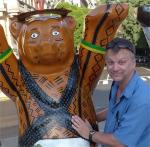Hanson, Paul
Research Interests
Carbon cycling: Lakes play important roles in carbon cycling at the watershed, regional, and even global scales. The balance between carbon sequestration and storage versus mineralization in lakes depends on how ecosystem boundaries are drawn, the nature of the lake and the load, and the time scale of interest. My research in carbon cycling focuses on how ecosystem processes alter these balances across different space and time scales in different ways among lakes of the world. Carbon cycling theme pervades work in a number of funded research projects in which I’m the lead PI or a co-PI, including the North Temperate Lakes LTER, a Wisconsin Focus on Energy project, and a collaborative project funded by Mellon foundation on regional carbon cycling modeling in Wisconsin.
Ecosystem variability: My general interest in ecological scaling issues underlies recent work in cross-scale analyses of lake data sets. Ecological data are inherently messy and tend to show pattern at multiple scales — a phenomenon especially evident in data from sensor networks. Understanding controls over that variability presents analytical challenges that benefit from signal processing tools, such as wavelet transforms, spectral analysis, and other system identification approaches. The payoff has been a clearer picture of, e.g., how dissolved oxygen in lakes is controlled by internal waves at short time scales, metabolism at days to weeks, and long-term weather oscillations at decades. Such approaches also show promise for developing scaling laws governing, e.g., phytoplankton dynamics.
Microbes, algae, and even fish: Although some of my past work has emphasized fish bioenergetics and fish identification through software and modeling tools, I’ve recently downsized in organisms. The control over microbial (bacteria and phytoplankton) dynamics in real ecosystems remains a mystery under many conditions. Through partnerships with microbial ecologists and physical limnologists at the University of Wisconsin and in the Global Lake Ecological Observatory Network (GLEON), we are using high-tech sensor network measurements, coupled physical-chemical-biological models, and signal processing to study the vagaries of microbial dynamics. Studies of algal blooms, for example, are central to much of the research happening on Lake Mendota in Madison, Wisconsin.







